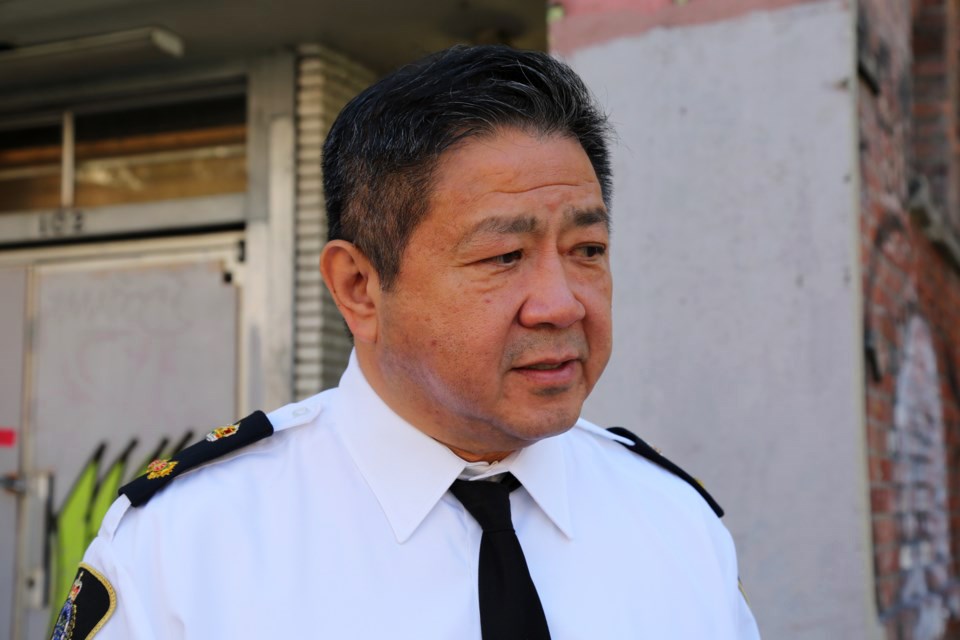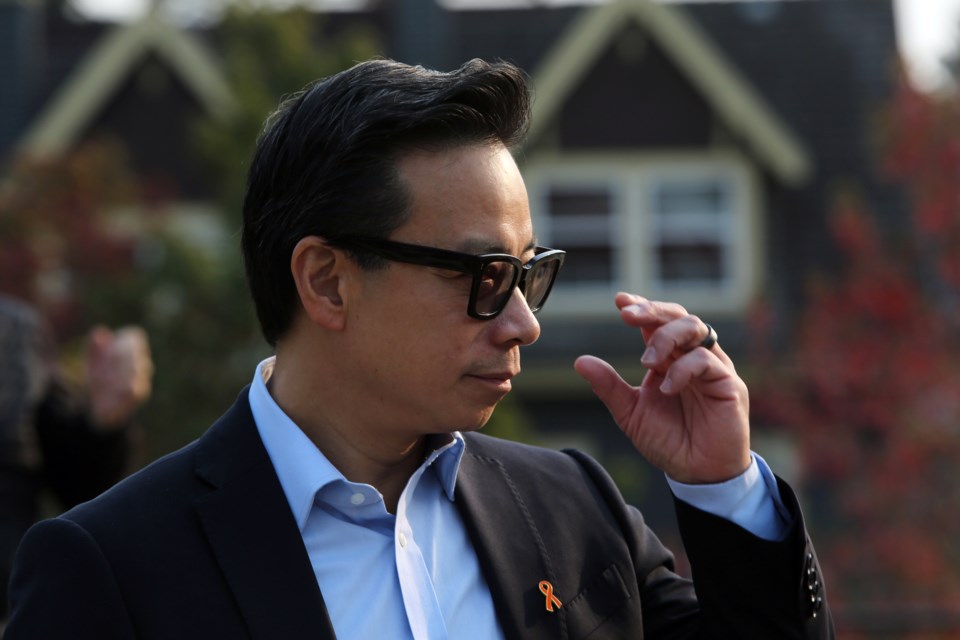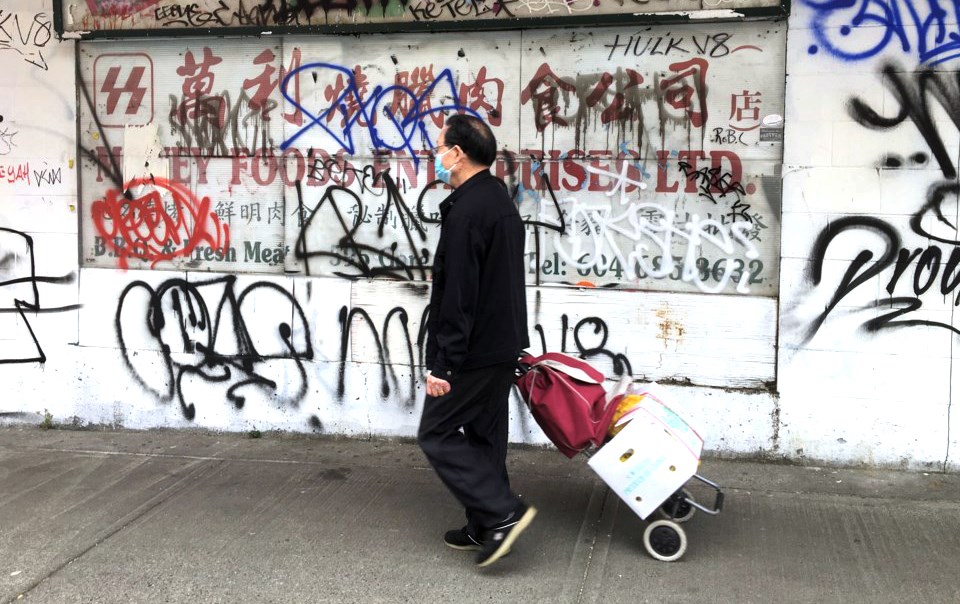A Vancouver deputy police chief is calling on all three levels of government to boost investment in Chinatown to help decrease drug-fuelled crime, street disorder, and racist vandalism that continues to negatively affect residents and business operators.
Howard Chow told the Vancouver Police Board at its Oct. 20 meeting that efforts from the city’s public works department, police force, and other organizations in San Francisco’s Chinatown have improved life for residents and merchants and there’s no reason Vancouver can’t do the same.
“If a big Chinatown like that is able to do it, most certainly we can,” said Chow, who recently joined a delegation of police officers and Chinatown leaders on a trip to San Francisco’s Chinatown.
“We just need the funding resources and the different levels of government to jump in. And that's a significant impediment right now — is we don't have that full investment, and that's what we need."

As Glacier Media has previously reported, Chinatown has been hit hard since the pandemic was declared in March 2020 by anti-Asian hate crimes, violent attacks on citizens, and an increase in broken windows and unsanctioned graffiti on private buildings.
Some businesses have closed, others have moved and those still open have seen a downturn in customers, according to interviews Glacier Media conducted over the past two years with merchants and business leaders.
The delegation, whose trip was paid for by the Vancouver Police Foundation, visited San Francisco’s Chinatown last month. The California city’s Chinatown borders the Tenderloin district, which has similar social issues to the East Hastings Street corridor.
In a presentation to the police board, Staff Sgt. Eugene Lum said San Francisco’s Chinatown covers about 24 blocks compared to Vancouver’s more concentrated Chinatown, which mainly runs along East Pender, Keefer, and East Georgia streets across Main Street.
'A complete makeover'
Lum and Lorraine Lowe, executive director of the Dr. Sun Yat-Sen Classical Chinese Garden in Chinatown, were members of the delegation and met with city officials, police, business operators, and volunteers in San Francisco.
Lum pointed to an alley beautification program in San Francisco’s Chinatown that is making a positive difference in the community.
“They look at an alley and if it meets the criteria, they do a complete makeover,” he said. “They install better lighting, they replace the streets sometimes with cobblestones, they hang lanterns…just to beautify the area.”
Lum said the program not only gives residents a sense of community pride, but it also draws tourists and generates foot traffic. He noted some of the alleys have banned vehicle access and only allow pedestrians.
“It’s great for local merchants,” he said.
'Safe and thriving'
Lowe praised the graffiti removal program operating in San Francisco’s Chinatown and the efforts of the city’s public works department in continuing to keep the streets clean via power washing of streets and sidewalks.
“There's a very strong sense of communication between the department of public works and the residents and the businesses,” she said.
San Francisco’s Chinatown also has volunteer patrols and a group called the Delta Chinatown Initiative, which Lowe said supports law enforcement, helps deter crime, and holds criminals accountable for crimes.
Its mission, according to the group’s website, is to ensure residents, businesses, and visitors of San Francisco's Chinatown “are safe and thriving.”
The Initiative has organized anti-Asian hate rallies and secured money for surveillance cameras and a victims’ awareness group, which helps seniors and others faced with language barriers get informed about their legal rights.
It also supports tenants in single-room-occupancy hotels.
“The key takeaway here that I'd like to see is coordination, communication, engagement, taking pride in our community and ownership within our community — and having less anonymity than what's happening in our Chinatown right now,” she said, referring to an earlier comment from Lum about “systemic silencing” in the Chinese community.
Lum said the Chinese community in Vancouver has “never had a very loud voice in terms of politics and agendas and that sort of thing.”
“So when community leaders such as Lorraine started speaking out about some of the issues quite vocally — the anti-Asian hate, the vandalism, the street disorder — there was a small group of community members who pushed back and basically said to Chinatown's community leaders, ‘Stop complaining, be quiet,’” Lum said.
The police board heard there was a 296 per cent increase in graffiti and vandalism in Chinatown between 2019 and 2021. Anti-Asian hate crimes increased 400 per cent between 2018 and 2022, with Lum saying “it is probably the main issue for Chinatown right now.”
“We've all heard about the stories — the 87-year-old senior who was bear-sprayed, Harold Johnson, the longtime Chinatown security worker who was assaulted, the Skip the Dishes driver who was violently stabbed while doing a delivery in Chinatown,” he said.
“What you don't see is the fact that the department is getting anti-Asian hate incidents across the city every two to three days. And these are incidents that don't make the media.”

City satellite office in Chinatown
The police board meeting occurred six days after ABC Vancouver mayoral candidate Ken Sim was elected the city’s new mayor. He will be sworn in on Nov. 7 and will lead a majority government with seven of the party’s council candidates.
Sim promised during the campaign to hire 100 officers, 100 mental health nurses and support a VPD graffiti abatement program across the city. He also wants the city to set up a satellite office in Chinatown for residents and business operators.
A community police station already exists on East Pender Street.
No one from city staff accompanied the delegation to San Francisco’s Chinatown.
Deputy city manager Karen Leavitt was invited but had a scheduling conflict. Another city staff person was supposed to go in her place, but scheduling was also an issue, according to the city’s communications department.
The city has worked on revitalization efforts in Chinatown for decades but progress has been challenged by social issues in combination with newer Asian-centric cities in Richmond and Burnaby attracting customers and businesses.
Investment from government has also been an issue, as Michael Tan, co-chair of the Vancouver Chinatown Legacy Stewardship Group, told Glacier Media last year for a feature story that examined the state of the community.
'Committed to the revitalization work'
In an email Monday, the city said the Chinatown “transformation team” has worked with the community to create a plan and implement initiatives that focus on sustaining heritage buildings, as well as “intangible living heritage” — language, performing arts, social practices, rituals, festive events “and specific knowledge, practices, skills, and culture.”
“The City of Vancouver is grateful for the many contributions the Chinese community has made to Vancouver and recognizes Chinatown as an important part of Vancouver’s cultural identity,” the city’s email said.
“The City is committed to the revitalization work in the area, ensuring Chinatown legacy can be accessed and enjoyed by future generations.”
Police Chief Adam Palmer said he was optimistic about the future of Chinatown but emphasized government investment is key to transformation.
“The community is going to feel let down if we don't have levels of government focusing on those core services that taxpayers expect,” Palmer said.
“San Francisco has done a great job stepping up with that. We're seeing signs that we think our city is going to start heading in that direction, which I think is going to be positive. I think in a year from now, once all the pieces get in place, I think Chinatown's going to look way better than it does today.”
@Howellings



